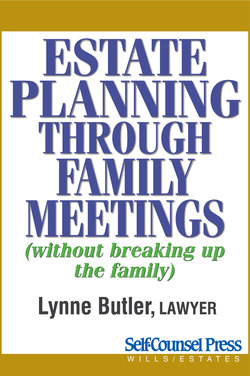Читать книгу Estate Planning Through Family Meetings - Lynne Butler - Страница 19
На сайте Литреса книга снята с продажи.
9. Privacy Concerns
ОглавлениеAnyone undergoing the process of estate planning will have to divulge detailed information about his or her income, assets, and debts to the estate-planning lawyer. That is the only way a client is going to get accurate advice about what to do. Estate planning is like a jigsaw puzzle in which all the pieces (i.e., family, business, money, health, retirement) have to fit together, and they only fit if all of the pieces are revealed. The person who wants to do estate planning may also have to discuss these topics with an accountant or a financial advisor in order to get appropriate advice.
Many parents say that they do not want their children involved in the estate-planning process because they do not want to reveal confidential information to anyone other than their professional advisors. They believe their financial affairs are none of the children’s business, and it is their right to maintain that. Because of this wish for privacy, many parents put off their estate planning, believing that they must tell their children about everything they own.
This concern for privacy should not prevent your parents from going ahead with their planning. The extent of your involvement or that of your siblings or other family members can be controlled according to your parents’ wishes. It is everyone’s right to keep their financial and personal matters private if they so choose. Some parents choose to tell their children about their finances and others do not. It is very much a personal decision so you should do your best to work with it.
If your involvement in their planning goes no further than motivating them to get started, and perhaps helping them find a lawyer, you can probably alleviate most of their concerns about privacy. If they do not tell you themselves about what they own and the value of their holdings, there is no way for you to know about these things.
A compromise might be that your parents will tell you about the kind of assets they have, and possibly where the assets are located (e.g., where they bank and where title deeds are stored) without having to tell you the dollar amounts. This will allow them some amount of privacy while still allowing you and any professional advisors to understand the situation.
For example, you can understand whether the family home is owned by both parents or by only one without knowing the appraised value of it. You can know whether there is life insurance without knowing the dollar amount. You can know whether they still own shares in a business they retired from years ago without knowing the share value. In this way, you can preserve their privacy while getting going on the planning.
Even if you share the same lawyer with your parents, the lawyer is bound by solicitor-client confidentiality, which is the duty of every lawyer to keep each client’s legal affairs confidential. This can become extremely important in smaller towns where there are not many lawyers and whole families consult one lawyer about various matters. You can assure your parents that the lawyer will not share a client’s information with anyone, including family members, without specific permission from them to do so.
People also sometimes feel that during the estate-planning process, they are being pressured into revealing financial details that they would otherwise prefer to keep private. Many older people just do not like letting the world in general know how much they have put away and it makes them uncomfortable and resentful if they are pressured for that information. They should not have to reveal information they do not want to reveal to family members.
Understand that estate planning can be done without your parent having to divulge details about the amounts held in bank accounts or investments. The type of asset and the way it is held (e.g., joint owners, sole owner) are much more important in the planning process than the actual dollar amount. If your parent is concerned about giving out too much financial information, suggest to him or her that he or she divulge that information only to the lawyer, who is not allowed to tell other people.
